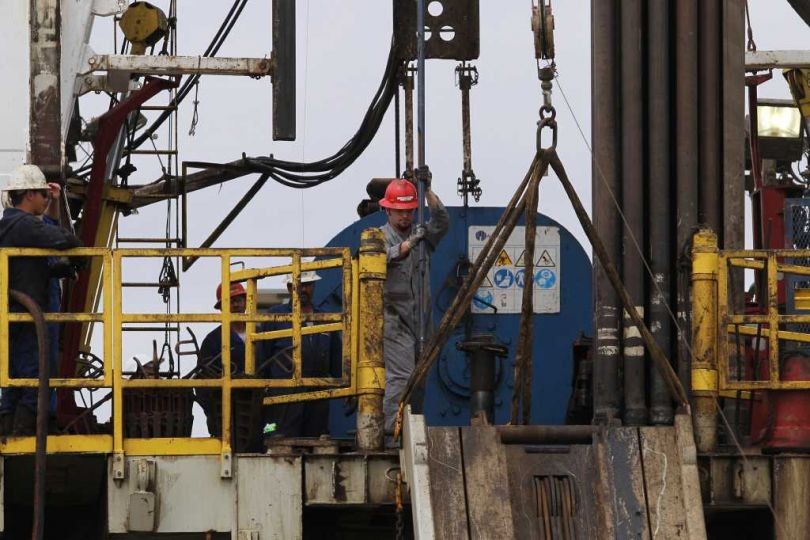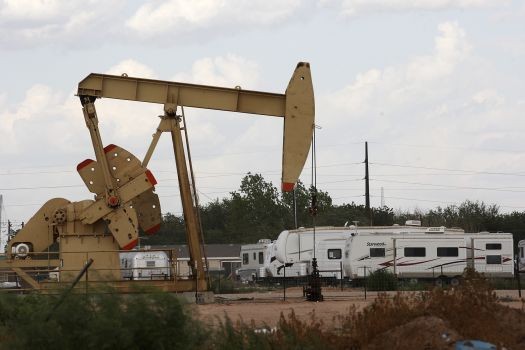South Texas enjoys boom while it lasts San Antonio ExpressNews
Post on: 10 Май, 2015 No Comment

Photo By JOHN DAVENPORT/SAN ANTONIO EXPRESS-NEWS
Welding crews are busy laying pipelines such as this one east of Karnes City, Texas in order to get oil and gas extracted from the Eagle Ford shale formation to market. Pipelines are critical because hauling by truck is more expensive. JOHN DAVENPORT/jdavenport@express-news.net
Photo By JOHN DAVENPORT/SAN ANTONIO EXPRESS-NEWS
Eric Poor, and employee of the Lufkin Company, works on a newly installed pump jack that pumps oil from the Eagle Ford shale formation near Kenedy, Texas. The Eagle Ford shale underlies 24 Texas counties that stretch from a region northeast of San Antonio to Laredo and Webb County. JOHN DAVENPORT/jdavenport@express-news.net
Related Stories
KARNES CITY — It was almost a half-century ago that John Braudaway had his first encounter with the hydrocarbon-soaked, deep shale formation that is turning a large swath of South Texas into one crazy boomtown.
“In 1962, I was roughnecking on a crew north of town. And when we drilled through the Eagle Ford shale, it kicked back on us with a lot of pressure. It took us three days to choke it off,” he recalled.
“I told the geologist, ‘You’ve got a good well here. Let’s run ’er out.’ But he said, ‘Naw, it’s that old Eagle Ford shale. It will produce for four or five days and then seal off,’ ” said Braudaway, 71, who’s still in the oil business.
But about a year ago, a new extraction technology called hydraulic fracturing began unlocking the mineral riches held in the deep shale vault that runs from the Mexican border northeast for hundreds of miles.
These days, the Eagle Ford is the hottest play in the country, with some South Texas oil wells producing several thousand barrels a day as well as abundant flows of natural gas.
The play is creating jobs and sudden wealth in a chronically depressed region that long survived on cattle and agriculture, between periodic oil and gas booms.
In some areas, mineral leases that a few years ago went for a few hundred dollars an acre now are commanding $10,000 and up. For the very fortunate few, monthly royalty checks can run to six figures and lease bonus checks are even larger.
“This place went from desolate to booming. There are quite a few millionaires now in Karnes County. They are being made every day,” Braudaway said during a recent tour of the county. “As soon as they flare a well, you can become a millionaire, and some of them have become millionaires just off the oil and gas lease bonus.”
Trip Ruckman, 66, president of the Karnes County National Bank. said deposits rose by $2 million a month last year, and now may be double what they were five years ago.
“What’s good is that a lot of mineral interest around here is owned by small landowners and farmers,” he said. “The wealth is getting spread around pretty well.”
Ruckman said that after decades of lean times, no one is throwing the money around.
“It’s fun. We’re enjoying it, but a lot of people are not used to being flush. It’s kind of unbelievable for most of them, and they are sitting on it to a large extent,” he said.
The drilling figures kept at the Railroad Commission tell the production story.
In 2008, the state issued 33 drilling permits for the Eagle Ford shale. In 2009, it jumped to 94, and last it year it exploded, to 1,229 permits. While figures for the first quarter of 2011 aren’t available, the furious pace of drilling continues.
Correspondingly, sales tax collections are climbing by double digits in areas most affected by the play.
According to a recently published economic impact study by experts at the University of Texas at San Antonio. the long-term regional implications of the boom are staggering.
“Under modest assumptions, by 2020 the Eagle Ford shale is expected to account for close to $11.6 billion in gross state product, $21.6 billion in total economic output impact and support close to 67,971 full-time jobs in the area,” according to the executive summary.
At ground level, the first fruits of the boom, which already has brought thousands of new workers — most of them driving white pickups — to South Texas and uncounted millions in oil company investments, are everywhere.
In Kenedy, the State Motel has been booked solid for two years to oil company workers, and it likely will keep the “No Vacancy” sign up awhile longer.
“We’re gonna be full for the next five years,” said Maria Munoz. the manager.
Just down the road is the Pecan Grove RV Park, one of the many cropping up on empty lots almost overnight around the play.
“The bonus money built this park. I’ve got a little over 100 acres leased, and they have nine months left to drill,” said owner David Brodsky. 48, of Kenedy, one of the new Eagle Ford millionaires.
With the Pecan Grove already full, Brodsky is building two more RV parks. And he just finished signing another lucrative mineral rights deal.
“I just leased another 14 acres, and I got $10,000 an acre plus 25 percent royalty. It’s nice to be able to do some of the things I’ve wanted to do all my life,” he said.
In Gonzales, the city has rented out 100 RV pads at the rodeo grounds to oilfield workers and plans to add 100 more, according to Charles Winwehand. the acting city manager.
“We continue to get requests weekly for places for new RVs, but the town is pretty much full and there are no housing vacancies,” he said.
In Cuero, officials are planning a new 300-home subdivision to house oil field workers, as oil companies are quickly buying real estate and setting up shop.
“Geo Southern has bought a building. Petro Hawk, which was the first company to drill, is also here. And Pioneer Natural Resources just purchased 134 acres in our industrial park,” DeWitt County Judge Daryl Fowler said.
Even in tiny, long-snoozing Tilden, things are hopping.
“It’s hard to get in to eat at any of the cafés or restaurants. And it’s hard to get gas because so many vehicles are waiting. I don’t think I can ever remember that. And right now, we’re in the early stages,” McMullen County Judge Jim Teal said.
In Carrizo Springs, Lee’s Steakhouse — like most restaurants in the play — is regularly jammed with free-spending newcomers.
“These people work 16 to 18 hours a day in the field, and they are hungry. They’ve got money and they pretty much order whatever they want. We’re packed every night,” said owner Lee Vallejo. who now has expanded both his menu and his business hours.
Everywhere, there is a shortage of skilled workers. And there is money to be made in the most improbable ways.
Because the “fracking” process requires tremendous amounts of water, cities such as Carrizo Springs are trying to figure out how to turn treatment plant effluent into cash.
“We’re talking about it up for bids to see what comes in. The oil industry is paying about 50 cents a barrel right now for gray water, and we generate about a half-million gallons a day,” City Manager Mario Martinez said.

The competition for mineral rights among the “lease hounds” who now are swarming over land records in county courthouses across South Texas has driven lease prices sky-high and caused some to take unusual risks.
“We’re getting a lot of ‘top-leasing,’ where one company leases on top of another, betting that the first one won’t be able to perform before the lease expires,” said David Phillip. 61, a veteran Karnes County oil and land man.
And because most leases lapse if drilling doesn’t occur within three years, the landowners are hoping to cash in twice by signing a second lease with a company that’s willing to gamble.
“And the landowner hopes the first lease lapses because the royalty on the second one will be better,” he said.
Strain on the system
But the sudden influx of thousands of new workers and fleets of heavy oil field equipment also is taking a toll in lightly populated rural South Texas, causing traffic jams and ruined roads.
“We have constant traffic, day and night, big trucks and oil tankers. At the H-E-B and Wal-Mart, it’s hard to find parking, and by 4 p.m. practically everything is gone from the shelves,” said Carrizo Springs Mayor Ralph Salinas, who quickly noted that he isn’t complaining.
Other problems are more serious and expensive.
“We have a lot of road damage, and while some of these oil companies are very good about working with us, others are not,” said La Salle County Judge Joel Rod8riguez, adding that county bridges also have been damaged. “We have a lawsuit with some of these oil companies over damage for $5 (million) to $7 million. I think there is damage everywhere.”
In Karnes County, traffic problems caused by 18-wheelers running wild prompted county officials to call in a state police task force this year.
“We weren’t prepared for this. Starsky and Hutch couldn’t do this job unless we gave them the tools,” said County Judge Barbara Shaw, adding that the increased tax revenues needed to hire more deputies are a year or two away.
“We had many citizens calling to complain about speeding and safety problems. So the DPS brought a task force to town, and they were highly visible. I’m sure they wrote a lot of tickets,” she said. “The big joke in town was that my husband got at least one ticket. He runs water trucks.”
Alfred Pawelek. 81, a former Karnes County judge and businessman, said the Eagle Ford play is lifting a region that seemed on a relentless slide toward poverty.
“We have been orphans here in Karnes County ever since I can remember. When I went into drive-in movie business here in 1950, we had 25,000 people in the county. When I got out in 1975, we were down to 12,000,” he said.
About 16,000 now live in Karnes County, and many were just getting by before the boom.
“It’s long past due. Our landowners have just been holding on,” Pawelek said. “Once every three years they’d get a crop. Now, with the good leasing going on, I can see they are building hay sheds and new fences, and buying new trucks.”
But, as anyone who has spent a lifetime in South Texas wells knows, the good times always end.
“There’s always a dark side. Every oil boom becomes a bust,” said Fowler, the DeWitt County judge. “They keep talking about this being a 20-year shot for us, but the economy could crater or we could run into environmental problems.
“Right now we’re in the glory days, and as long as we watch our budget, we’ll be safe.”
As originally published, this story contained an error.














